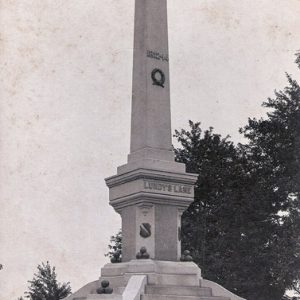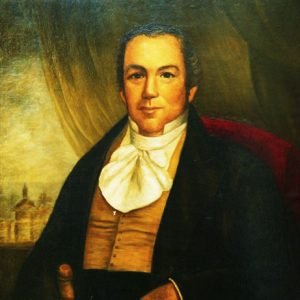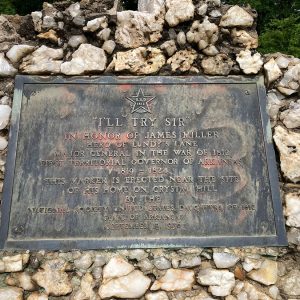calsfoundation@cals.org
James Miller (1776–1851)
James Miller, who served as a brigadier general during the War of 1812, was the first governor of the Arkansas Territory and served as superintendent of Indian Affairs for the Arkansas Territory.
James Miller was born in Peterborough, New Hampshire, on April 25, 1776, to James Miller and Catharine Gregg Miller. Evidence suggests that Miller’s father was a farmer. Miller attended an academy at Amherst, Massachusetts, and Williams College. He married Martha Ferguson, with whom he had one son, James Ferguson Miller, a noted naval officer. After Martha’s death, he married Ruth Flint.
Prior to entering the military, Miller practiced law in Greenfield, New Hampshire, from 1803 to 1808. Due to his experience with the state militia, he received a commission as a major in the Fourth United States Infantry in 1808. In command of the Twenty-first United States Infantry by the time of the War of 1812, Miller distinguished himself at the Battle of Lundy’s Lane, where he was known to have said “I will try sir!” when ordered to take a position by his superior during intense combat. Becoming known as the “Hero of Lundy’s Lane,” the phrase stuck as his personal slogan. Due to outstanding performance during the war, he was elevated to the rank of brigadier general and given a gold medal by Congress for gallantry in multiple engagements.
Appointed governor of the Arkansas Territory on March 3, 1819, Miller resigned from the army. To avoid the excessively hot summer in the South, Miller did not leave New England for his governorship until September 1819. Taking a non-direct route, he traveled to Washington DC first, where he learned that he would also serve as the superintendent of Indian Affairs for the Arkansas Territory. Traveling next to Pittsburgh, Pennsylvania, Miller acquired armaments for the territorial militia. He then traveled down the Ohio and Mississippi rivers with the armaments in tow, arriving at Arkansas Post (Arkansas County) on December 26, 1819, on a vessel flying flags reading “Arkansaw” and “I will try, sir!” Due to Miller’s tardiness, Robert Crittenden, the secretary of the territory, had been running the state and filling necessary appointments.
The first major issue of Miller’s governorship involved the validity of the elections, actions, and appointments under Crittenden’s leadership. After lengthy debate, Miller accepted these actions, as the U.S. Congress had validated the elections. Turning to other issues, he focused his attentions on finding a suitable location for a territorial capital. Considering that a number of influential men in the territorial legislature had purchased lots in the Little Rock (Pulaski County) area, including Miller, the bill moving the capital from Arkansas Post to Little Rock passed the territorial legislature.
As superintendent of Indian Affairs for the territory, Miller dealt with the considerable debate over Quapaw, Cherokee, and Choctaw land claims and the desire for American whites to take the land for themselves. To make matters more confusing for Miller, warfare between the Cherokee and the Osage erupted within the territory in 1821.
Overall, Miller did not prove effective as governor or Indian agent. From the beginning of his term, it was clear that he did not plan to stay in Arkansas, as his wife remained in New Hampshire. Miller left the torrid Arkansas summer for cooler New Hampshire in April 1821, returning the following November. In his absences, Crittenden ran Arkansas and made decisions regarding the Native American problems. Finally, in June 1823, Miller left Arkansas and did not return at all that year.
In the fall of 1824, he was elected to the House of Representatives in New Hampshire.
Resigning his appointment as territorial governor of Arkansas in December 1824, Miller also refused the New Hampshire congressional seat, instead accepting the appointment as collector for the port of Salem, Massachusetts. Author Nathaniel Hawthorne devoted a section of “The Custom-House” chapter of The Scarlet Letter to Miller, whom Hawthorne served alongside for a time at the Salem port. Miller held the post until 1849, when he suffered a stroke. He died due to the effects of a second stroke on July 7, 1851, in Temple, New Hampshire.
Miller County in Arkansas and Miller State Park in Peterborough, New Hampshire, are named in honor of James Miller.
For additional information:
Bolton, S. Charles. Arkansas 1800–1860. Fayetteville: University of Arkansas Press, 1998.
Ledbetter, Cal. “General James Miller: Hawthorne’s Hero in Arkansas.” Arkansas Historical Quarterly 47 (Summer 1988): 99–115.
White, Lonnie. “James Miller: Arkansas’ First Territorial Governor.” Arkansas Historical Quarterly 19 (Spring 1960): 12–30.
Derek Allen Clements
Pocahontas, Arkansas











For years, my father told me that John Wesley Harden is my great-grandfather’s cousin. I then find out that James Brown Miller is a cousin of John Wesley Harden? My family is from Indiana/Ohio, and I’m looking into this. My father died this past January, and my grandfather died in 2005 at the age of 106.